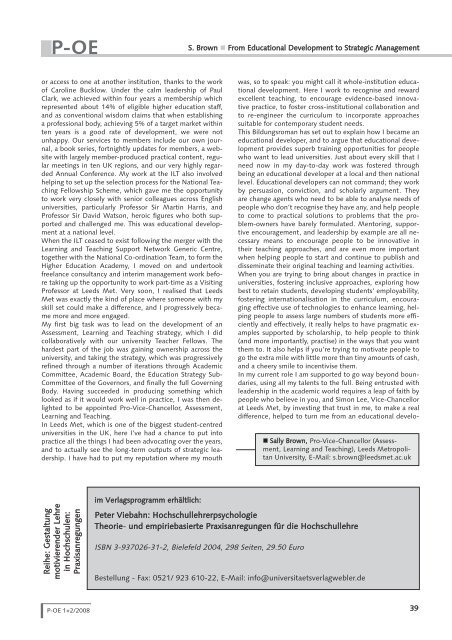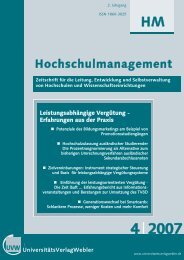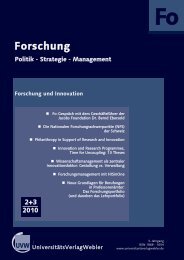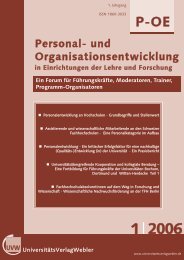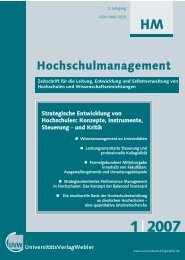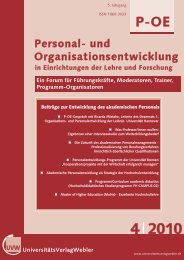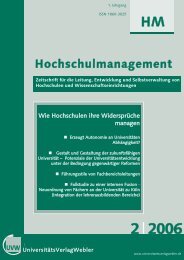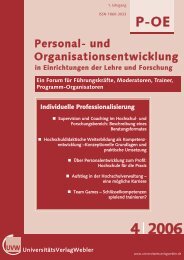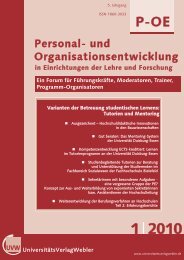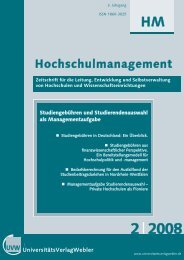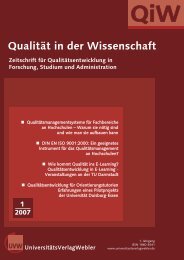P-OE - UniversitätsVerlagWebler
P-OE - UniversitätsVerlagWebler
P-OE - UniversitätsVerlagWebler
Erfolgreiche ePaper selbst erstellen
Machen Sie aus Ihren PDF Publikationen ein blätterbares Flipbook mit unserer einzigartigen Google optimierten e-Paper Software.
P-<strong>OE</strong><br />
S. Brown • From Educational Development to Strategic Management<br />
or access to one at another institution, thanks to the work<br />
of Caroline Bucklow. Under the calm leadership of Paul<br />
Clark, we achieved within four years a membership which<br />
represented about 14% of eligible higher education staff,<br />
and as conventional wisdom claims that when establishing<br />
a professional body, achieving 5% of a target market within<br />
ten years is a good rate of development, we were not<br />
unhappy. Our services to members include our own journal,<br />
a book series, fortnightly updates for members, a website<br />
with largely member-produced practical content, regular<br />
meetings in ten UK regions, and our very highly regarded<br />
Annual Conference. My work at the ILT also involved<br />
helping to set up the selection process for the National Teaching<br />
Fellowship Scheme, which gave me the opportunity<br />
to work very closely with senior colleagues across English<br />
universities, particularly Professor Sir Martin Harris, and<br />
Professor Sir David Watson, heroic figures who both supported<br />
and challenged me. This was educational development<br />
at a national level.<br />
When the ILT ceased to exist following the merger with the<br />
Learning and Teaching Support Network Generic Centre,<br />
together with the National Co-ordination Team, to form the<br />
Higher Education Academy, I moved on and undertook<br />
freelance consultancy and interim management work before<br />
taking up the opportunity to work part-time as a Visiting<br />
Professor at Leeds Met. Very soon, I realised that Leeds<br />
Met was exactly the kind of place where someone with my<br />
skill set could make a difference, and I progressively became<br />
more and more engaged.<br />
My first big task was to lead on the development of an<br />
Assessment, Learning and Teaching strategy, which I did<br />
collaboratively with our university Teacher Fellows. The<br />
hardest part of the job was gaining ownership across the<br />
university, and taking the strategy, which was progressively<br />
refined through a number of iterations through Academic<br />
Committee, Academic Board, the Education Strategy Sub-<br />
Committee of the Governors, and finally the full Governing<br />
Body. Having succeeded in producing something which<br />
looked as if it would work well in practice, I was then delighted<br />
to be appointed Pro-Vice-Chancellor, Assessment,<br />
Learning and Teaching.<br />
In Leeds Met, which is one of the biggest student-centred<br />
universities in the UK, here I’ve had a chance to put into<br />
practice all the things I had been advocating over the years,<br />
and to actually see the long-term outputs of strategic leadership.<br />
I have had to put my reputation where my mouth<br />
was, so to speak: you might call it whole-institution educational<br />
development. Here I work to recognise and reward<br />
excellent teaching, to encourage evidence-based innovative<br />
practice, to foster cross-institutional collaboration and<br />
to re-engineer the curriculum to incorporate approaches<br />
suitable for contemporary student needs.<br />
This Bildungsroman has set out to explain how I became an<br />
educational developer, and to argue that educational development<br />
provides superb training opportunities for people<br />
who want to lead universities. Just about every skill that I<br />
need now in my day-to-day work was fostered through<br />
being an educational developer at a local and then national<br />
level. Educational developers can not command; they work<br />
by persuasion, conviction, and scholarly argument. They<br />
are change agents who need to be able to analyse needs of<br />
people who don’t recognise they have any, and help people<br />
to come to practical solutions to problems that the problem-owners<br />
have barely formulated. Mentoring, supportive<br />
encouragement, and leadership by example are all necessary<br />
means to encourage people to be innovative in<br />
their teaching approaches, and are even more important<br />
when helping people to start and continue to publish and<br />
disseminate their original teaching and learning activities.<br />
When you are trying to bring about changes in practice in<br />
universities, fostering inclusive approaches, exploring how<br />
best to retain students, developing students’ employability,<br />
fostering internationalisation in the curriculum, encouraging<br />
effective use of technologies to enhance learning, helping<br />
people to assess large numbers of students more efficiently<br />
and effectively, it really helps to have pragmatic examples<br />
supported by scholarship, to help people to think<br />
(and more importantly, practise) in the ways that you want<br />
them to. It also helps if you’re trying to motivate people to<br />
go the extra mile with little more than tiny amounts of cash,<br />
and a cheery smile to incentivise them.<br />
In my current role I am supported to go way beyond boundaries,<br />
using all my talents to the full. Being entrusted with<br />
leadership in the academic world requires a leap of faith by<br />
people who believe in you, and Simon Lee, Vice-Chancellor<br />
at Leeds Met, by investing that trust in me, to make a real<br />
difference, helped to turn me from an educational develo-<br />
• Sally Brown, Pro-Vice-Chancellor (Assessment,<br />
Learning and Teaching), Leeds Metropolitan<br />
University, E-Mail: s.brown@leedsmet.ac.uk<br />
Reihe: Gestaltung<br />
motivierender Lehre<br />
in Hochschulen:<br />
Praxisanregungen<br />
im Verlagsprogramm erhältlich:<br />
Peter Viebahn: Hochschullehrerpsychologie<br />
Theorie- und empiriebasierte Praxisanregungen für die Hochschullehre<br />
ISBN 3-937026-31-2, Bielefeld 2004, 298 Seiten, 29.50 Euro<br />
Bestellung - Fax: 0521/ 923 610-22, E-Mail: info@universitaetsverlagwebler.de<br />
P-<strong>OE</strong> 1+2/2008<br />
39


